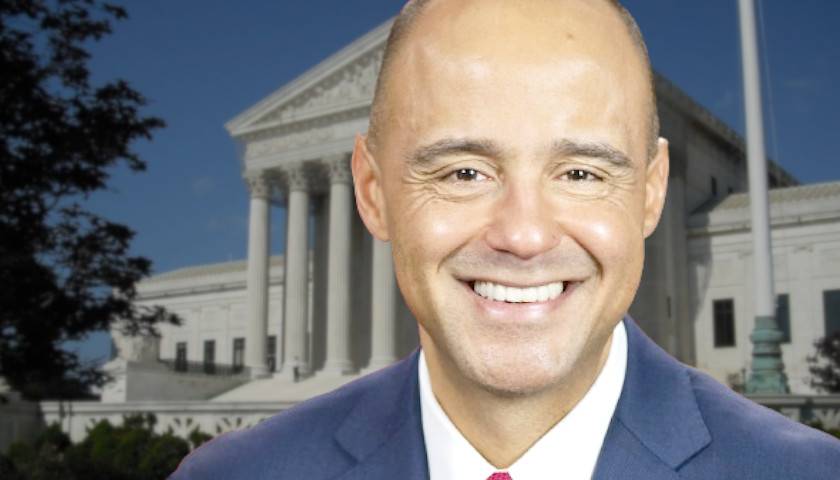Donald Trump filed his brief Tuesday at the U.S. Supreme Court to defend his argument that presidents are immune from criminal prosecution. Noting the lack of historical precedent and dire ramifications for the future, Trump’s attorneys warned that “a denial of criminal immunity would incapacitate every future President with de facto blackmail and extortion while in office, and condemn him to years of post-office trauma at the hands of political opponents.”
Oral arguments on the groundbreaking question are set for April 25; a final opinion, which could be announced in late May or sometime in June before the current SCOTUS term ends, represents a do-or-die situation for Special Counsel Jack Smith’s four-count indictment against the former president for the events of January 6 and his alleged attempts to “overturn” the 2020 election. The case is now on hold awaiting a decision by SCOTUS.
But a week earlier, justices will debate another consequential matter tied to January 6: the Department of Justice’s use of 1512(c)(2), obstruction of an official proceeding. The Supreme Court in December granted certiorari in Fischer v. USA to consider whether the DOJ has illegally applied the statute in its sprawling and ongoing criminal prosecution of January 6 defendants.
More than 330 protesters have been charged with the evidence-tampering law passed by Congress in the aftermath of the Enron/Arthur Anderson accounting scandal; the count also represents half of Jack Smith’s J6-related indictment against Trump.
Most legal observers, even the most reliable J6 propagandists, expect the highest court to overturn how prosecutors and at least 17 D.C. judges on both the district and appellate court weaponized the law against J6 protesters.
Beryl Howell, the former chief judge of the district court in Washington, recently signaled that the courts are preparing for a tsunami of motions this summer from individuals impacted by the obstruction count. “I am hearing from my colleagues that people facing sentencing on 1512(c)(2), facing plea offers to 1512(c)(2) are looking for postponements until after the summer term of the Supreme Court is over. It’s not unreasonable,” Howell said during a hearing last December for a J6er who had accepted a plea deal. Howell advised the prosecutors to seek a plea agreement on a separate charge. “We have to move the cases along. Otherwise what is June, July, and August of 2024 going to look like for all of the judges of this court, government — let alone counsel, defense counsel.”
In anticipation of a reversal, a few judges have released defendants currently incarcerated on a 1512(c)(2) conviction while other judges have delayed sentencing until the matter is resolved.
But U.S. Attorney for the District of Columbia Matthew Graves appears to be preparing a work-around solution should SCOTUS render such a humiliating defeat to both the DOJ and federal courts in Washington.
In a March 19 filing, Graves opposed the release of Anthony Williams, a J6 defendant serving a 60-month prison term for convictions on 1512(c)(2) and the four most common misdemeanors. (The sentence also involved an enhancement routinely applied to those convicted of 1512(c)(2); the D.C. appellate court earlier this month ruled the DOJ and D.C. judges unlawfully added the enhancement in over 100 cases.)
Graves (pictured above) warned that if SCOTUS overturns 1512(c)(2), paving the way for defendants to seek either vacated or reduced sentences, the government will simply seek more prison time for other convictions such as the misdemeanors in Williams’ case. “Even a reversal of Williams’s 1512(c)(2) conviction based on the ultimate outcome of Fischer would not necessarily reduce his sentence,” Graves, appointed by Joe Biden in November 2021, wrote. “[In] the absence of a 1512(c)(2) conviction, the government’s sentencing recommendation would likely be different and could include a request for consecutive sentences on Williams’s misdemeanor counts (up to thirty-six months).”
Prison sentences on multiple convictions are usually served at the same time. For example, Judge Howell, also overseeing the Williams case, sentenced him to 60 months in prison for the 1512(c)(2) conviction; 12 months each for two misdemeanors; and six months each for two other misdemeanors. Howell ordered the sentences to “run concurrently.”
But Graves is threatening 1512(c)(2) defendants who go to court asking for reduced jail time on multi-conviction cases that the government will simply go back to the judge and ask for prison sentences to be stacked on top of each other.
In other words—don’t you dare.
Not only is Graves’ approach a punitive admonition to J6ers planning to seek relief, but it’s also a thumb in the nose of the Supreme Court. Go ahead and reverse us, Graves is saying in so many words, we will find another way to punish these individuals.
Graves’ defiance is not surprising considering the political activity of his wife; Fatima Goss Graves, as I reported here, is the president of a radical leftwing $100 million nonprofit in Washington. She’s has visited the Biden White House at least three dozen times since her husband took on the role of lead prosecutor in charge of the “Capitol Siege” investigation.
Goss Graves also is part of a broad coalition demanding the resignation of Clarence Thomas. During the Brett Kavanaugh confirmation process, Goss Graves took a leading role in lobbying the Senate to scuttle his nomination to the Supreme Court.
Power couple, indeed.
It’s all part of a coordinated strategy, as I also reported here, between the Biden White House and other influential parties to pressure the Supreme Court into rendering a favorable outcome for the Biden regime on matters related to January 6.
The question remaining is—will it work?
– – –
Julie Kelly is an independent journalist covering the weaponization of the U.S. Government against her citizens, Follow Kelly on Twitter / X.




